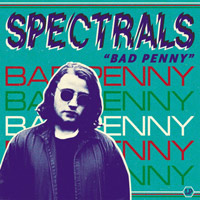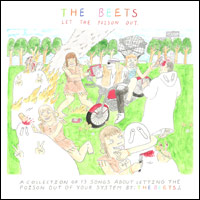
Bad As Me
Anti
For more than three decades, Tom Waits has presented himself as the house balladeer at some noire realm’s barroom, a dimly lit place where you can still smoke, where drinks are poured straight, and where closing time comes only when the sun rouses the regulars from their stupor. Like some bastard child borne from both the Beefheart and Sinatra gene pools, Waits has carved out this particular niche with his idiosyncratically gruff voice, singing tales of the down-and-out even after he himself straightened up and got sober more than 15 years ago. This work has placed him among the most iconic—Dylan, Cohen, Reed—of songwriters able to find poetry in the rubble of everyday life.
But even icons are never perfect (see Slow Train Coming, The Future, and Mistrial, respectively, for the above), though it’s hard to remember Waits releasing an album as mediocre as Bad As Me. Hell, one can almost hear the singer’s laurels squeaking as he rests on them on songs like “Raised Right Men” and “Pay Me.” Aside from “Hell Broke Luce,” on which Waits is oafishly politicized and heavy-handed, it’s not that any of the material found on the album is so far below standards. The problem is partially that the record lacks even the most minimal of thematic or sonic threads. Real Gone, Waits’ last studio record from 2004, at least had a gunky minimalism tying one song to the next, but Bad As Me is a disparate collection of motifs and sounds, so the weaker tracks fade quickly.
But this album also suffers from sounding purposefully anachronistic. “Chicago,” which leads off the record, is a jumpy mix of horns and guest Keith Richards’ nicked-blues licks that should lead to somewhere. On its own, though, it might as well be Man Man or some other such two-bit Waits wannabes. “New Year’s Eve” also isn’t strong enough to stand independently. A waltzing mix of accordion, horns and guitar not unlike so many others in Waits’ repertoire, the song gets too schmaltzy to bear when he segues into verses of “Auld Lang Syne.” Bad As Me is not without its moments, but they get lost amongst the bric-a-brac. Waits has been around the block enough to know better, so hopefully this album is just the result of a momentary lapse in judgement and not the beginning of some slow decline.
Stephen Slaybaugh

Gauntlet Hair
Dead Oceans
Back in January, when The Agit Reader declared Denver’s Gauntlet Hair as one of 2011’s Rated Rookies, the duo’s extremely slim output at the time (a single or two) prompted our initial excitement, but also was cause for speculation. The ragged glory of those tunes proved guitarist Andy R. and drummer Greg Nice were clearing quite a cacophonous path through indie rock. The question was how they would fare upon a wider palette. After several listens to their full-length, the answer is still a bit unclear. During the album’s first track, “Keep Time,” two bands immediately come to mind, and within a convergence of Animal Collective’s ever-unstable whirl of echoed tribe-rhythms and No Age’s ocean-sized riff blow-outs, Gauntlet Hair manage to escape with their own unique skin intact. That intangible “somewhere in between” is a polarizing place for the band to knock around in and reason enough to take sides. Purists might scoff at the insufferable amount of effects which mutate everything they touch, be it morphing the vocals into indecipherable yelps or carving canyons of reverb with the simple, jittery chords Andy R. employs. On the other hand, those enchanted by the sonic frivolity could claim that there aren’t enough boundaries shattered and that Gauntlet Hair is victim to too much structure. Either argument is just. That middle ground actually has a refreshing spartan quality to it. From afar it’s hard to see their shape, or hear any sense of a song, but even from that distance one can tell there’s a chaos that’s wildly colorful and infectious.
Gauntlet Hair is dominated by rhythm. With a percussive ring of the guitars and Craig Nice’s digital drum sequences, “Mop It Up” is a polyglot of beats coming from all directions. That larger-than-life (can’t say epic yet) sound is used almost to a fault; there’s a point where it’s hard to distinguish if there’s really any significant songwriting. Take the shimmering “My Christ,” for instance. The melody suggests everything from the Psychedelic Furs to PIL to Tears for Fears, inflated to a 21st century scale, but it’s hard to take anything memorable from it. “That’s Your Call” also has plenty of baubles and shiny orbs floating around, but then again, there’s no glue to keep these flailing experiments together. What Gauntlet Hair does with tired tropes is certainly ambitious, and the album has some brilliant splashes of modern pop, but it’s also a glorious mess. The rush is too immediate and in the end it feels somewhat hollow.
Kevin J. Elliott
MP3: “Top Bunk”

Live Music
Rough Trade
Having two excellent full-lengths and a handful of singles under their belts, the Austin-via-Dallas Strange Boys cast themselves as a pack of old souls with a precocious grasp of dusty Americana and shuffling R&B delivered with a raw Texas punch. They’ve shown moments of brilliance in the past, and a well-conceived crack at harnessing that talent to get it out to a wider audience is certainly a noble endeavor. But Live Music is, to put it bluntly, an utterly misguided attempt at doing so. At best, it’s a frustrating reminder of the band’s potential. At its worst, it’s calculated, scattershot, and cloying as it tries to be too many things to too many people.
The album begins with the bouncy piano-led power-popper “Me and You.” Occasionally recalling Badfinger’s “Come and Get It,” it’s a nice song and displays Ryan Sambol’s versatility as a songwriter. If this were the “pop hit” centerpiece of the album, it would work perfectly, but instead it’s one of the few honest moments on an album that overextends itself in its attempt to generate a polished, accessible product.
It’s entirely possible that the Strange Boys are making the record they’ve always wanted to make and are developing into the band they’ve always wanted to be. If so, more power to them. Yet the precipitous fall in quality from, say, the creaky garage of “Should Have Shot Paul” from the band’s debut to the neo-jam-boogie of “Doeuh” is so stark it’s almost confusing. One can’t help but wonder if it’s even the same band in the studio. In another miscalculation, “Walking Two By Two” takes the band’s skill with Stonsey twang and plays it for a gimmick, gilding a lazy, rolling melody with corny “bom-ba-dee-da” backing vocals and a harmonica so dull it might send Walter Daniels to an early grave.
What’s most troubling about Live Music is how ultimately bland it is—a direct result of trying to create a product that is slicker and more marketable than their previous efforts. While the band clearly used the studio for all it was worth, getting a bright professional sound throughout, it’s wasted on a sturdy but far too safe set of songs stripped of nearly all of the soul and grit the band is capable of generating. The Strange Boys got a little ahead of themselves, and though they may have wanted their own Good Bad Not Evil, they ended up with a clunker. Don’t count them out, but here's to next time.
Nate Knaebel
MP3: “Me and You”

Bad Penny
Slumberland
There’s been a mess of 1960s-inspired jangle-pop with echoey guitars, lovefilled lyrics, etc. Only Spectrals—essentially 21-year-old Brit Louis Jones and his brother Will on drums—go the way-fey route, edging into that other blog-ly trend, late-80s British twee-pop. The ubiquitous Phil Spector references might be too tough for this bloke, so my reference points would be Orange Juice, Jazz Butcher, Style Council, Belle & Sebastian—that sort of lilt. The fact that the songs are a bit indistinguishable from each other doesn’t help. That said, I’m a sucker for solidly tasteful guitar tones within such a misty pop context, and this record practically radiates with them.
And so, the jaunty rush of ”You Don’t Have to Tell Me,” “Big Baby” and “Doing Time” should be where Jones goes from here on out (this is his debut full-length, after some EPs), as they just graze the more fully developed romanticism of Sondre Lerche. Cuts like “Many Happy Returns” and “Luck Is There to Be Pushed” kind of stroll into some back lounge hallway where the spilled cocktails never got properly mopped up, so the feet stick a bit on the way out.
And that title? Shouldn’t it be “Bad Pence” or “Bad Farthing” or something? From the sound of this record and the pasty looks of Jones (who did us the disservice of putting his drab countenance on every page of the CD booklet) are otherwise proudly British. Well, “proud” might be kind of a strong word.
Eric Davidson

Let the Poison Out
Hardly Art
Queens trio The Beets belong to a long lineage of goofballs ranging from The Ramones to Ween. Over the course of (now) three full-lengths, the band’s rickety blend of scruffy pop and irreverence has developed into a defining aesthetic. While never being purposefully noisy, The Beets have seemingly made little effort to polish their recordings, instead leaving marks of imperfection as the aural equivalent of brushstrokes revealing the painter’s hand. Indeed, their culpability remains part of the band’s charm.
With a new drummer, Chie Mori, on board, there has been the slightest of alterations for Let the Poison Out, most markedly the addition of Mori’s vocals, which are comparatively sweeter and more melodic than those of the Beet boys, guitarist Juan Wauters and bassist Jose Garcia. She helps take “Wipe It Off” and “As the World” up a notch. Otherwise, though, they have essentially stuck to their guns, with cuts like “You Don’t Want Kids to Be Dead” and “I Don’t Know” not unlike their best work. Not that it matters either way. Like The Ramones before them, The Beets could make the same record again and again without things ever becoming uninteresting or redundant. And that’s saying something.
Stephen Slaybaugh
MP3: “Doing As I Do”
ALBUM REVIEWS
Ryan Adams, Ashes & Fire
Real Estate, Days
Jane's Addiction, The Great Escape Artist
My Brightest Diamond, All Things Will Unwind
Crooked Fingers, Breaks in the Armor
Zola Jesus, Conatus
High Places, Original Colors
Paley & Francis, Paley & Francis
Casiokids, Aabenbaringen Over Aaskammen
Feist, Metals
Comet Gain, Howl of the Lonely Crowd
Prince Rama, Trust Now
Loney Dear, Hall Music
VHS or Beta, Diamonds & Death
